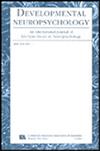智力天赋型注意缺陷多动障碍的临床和认知特征:系统综述。
IF 2.2
4区 心理学
Q3 PSYCHOLOGY
Developmental Neuropsychology
Pub Date : 2023-10-03
Epub Date: 2023-11-14
DOI:10.1080/87565641.2023.2279117
引用次数: 0
摘要
对过去15年的出版物进行了系统审查 多年来研究智力天赋(定义为智商)的影响 > 115,关于多动症的临床和认知特征。研究表明,大约15%的高智商人群符合多动症的标准。IQ对药物治疗没有影响,合并症与其他患有多动症的儿童没有区别。与平均IQ-ADHD相比,高IQ-ADHD往往表现出认知和行为症状的严重程度较低,预后较好;然而,高智商可能掩盖ADHD症状,从而延误诊断和治疗。本文章由计算机程序翻译,如有差异,请以英文原文为准。
Clinical and Cognitive Features of Attention Deficit Hyperactivity Disorder with Intellectual Giftedness: A Systematic Review.
A systematic review was carried out on publications from the last 15 years that have studied the effect of intellectual giftedness, defined as IQ > 115, on the clinical and cognitive features of ADHD. Studies indicate that about 15% of people with high IQ meet ADHD criteria. IQ has shown no effect on the pharmacological treatment, and comorbidity does not differ from that of other children with ADHD. High IQ-ADHD, compared to average IQ-ADHD, tends to show less severity in cognitive and behavioral symptoms, as well as a better prognosis; however high IQ may mask ADHD symptoms delaying diagnosis and treatment.
求助全文
通过发布文献求助,成功后即可免费获取论文全文。
去求助
来源期刊
CiteScore
2.80
自引率
6.70%
发文量
17
审稿时长
>12 weeks
期刊介绍:
Devoted to exploring relationships between brain and behavior across the life span, Developmental Neuropsychology publishes scholarly papers on the appearance and development of behavioral functions, such as language, perception, and social, motivational and cognitive processes as they relate to brain functions and structures. Appropriate subjects include studies of changes in cognitive function—brain structure relationships across a time period, early cognitive behaviors in normal and brain-damaged children, plasticity and recovery of function after early brain damage, the development of complex cognitive and motor skills, and specific and nonspecific disturbances, such as learning disabilities, mental retardation, schizophrenia, stuttering, and developmental aphasia. In the gerontologic areas, relevant subjects include neuropsychological analyses of normal age-related changes in brain and behavioral functions, such as sensory, motor, cognitive, and adaptive abilities; studies of age-related diseases of the nervous system; and recovery of function in later life.
Empirical studies, research reviews, case reports, critical commentaries, and book reviews are featured in each issue. By publishing both basic and clinical studies of the developing and aging brain, the journal encourages additional scholarly work that advances understanding of the field of lifespan developmental neuropsychology.

 求助内容:
求助内容: 应助结果提醒方式:
应助结果提醒方式:


